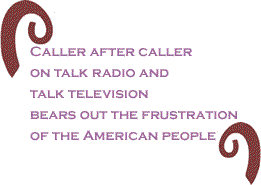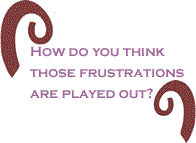
|
||||||||||||||||||||||
 |
||||||||||||||||||||||
 |
||||||||||||||||||||||
 |
||||||||||||||||||||||
 |
||||||||||||||||||||||
 |
| The current issue is always free to everyone |
|
|
 |
| The petty picking at Barack Obama continued into this week’s Pennsylvania primary as Hilary Clinton continued to grasp at straws in her last ditch effort to remain relevant for the Democratic Party nomination. For the last two weeks, Clinton and pundits have used Obama’s inarticulation on the subject of economic hardship, as a reason to suggest that he doesn’t understand “working class” America. Framed in every context from elitist to defeatist, Barack’s “bitter” comment reaction is a study in relative rhetoric as many around the nation still don’t want to have an honest conversation about why working people struggle in the American economy and why jobs leave only to never return to the communities they left. Relative, in the sense that, the bitter “pill” is only relevant when someone else says it. Rhetoric, because it is a diversion from the real point that Barack was trying to make - that frustration with the economy has a universal reaction that all can appreciate. In some communities, it’s sporting outlets - in other communities, it’s violence, in other communities still, it’s religion. There is a bitterness in all of us when life isn’t what it’s supposed to be, or what we think it should be. And the truth isn’t always pretty. But truth is truth.
What’s more telling in this whole escapade is that everyday working people know what the deal is, but some choose to cling to things that Barack didn’t mention, such as their racial bias against Blacks or immigrants, as the basis for why “good ole’ Americans” aren’t working. Those are the ones that won’t support Barack anyway, so there’s no need to give them cover. They’ll find any reason to support Hilary - notice how the media codifies Hilary’s misstatement about her Bosnia trip as an “episode” instead of calling it what it was, a “lie.” Moreover, they’re willing to ask Barack what he meant by his term “bitter” a thousand times, but will not once ask Clinton what she meant in her gun fire “moment.”
Bitterness in America is pervasive inasmuch as the nation has become an increasing more hostile society as people become increasing more hostile about the state of their lives. Drinking beer and taking whiskey shots are part and parcel of what many do to cope in the American class divide. Others hunt, while others pray to divert themselves away from the realities of their lives. Where racism was once the great visible “sin” of the nation, classism was the great invisible “unspoken” one as egalitarianism (society of equals) was the premise and pretense to eliminate class conflict. Classism is America’s new sin and it is the root of conflict in our society. The world’s most affluent society is beginning to crack under the weight of its own decadence.
BlackCommentator.com
Columnist Dr. Anthony Asadullah Samad is a national
columnist, managing director of the Urban Issues Forum
and author of the new book, Saving
The Race: Empowerment Through Wisdom |
Your comments are always welcome. e-Mail
re-print notice
If you send us an e-Mail message we may publish all or part of it, unless you tell us it is not for publication. You may also request that we withhold your name. Thank you very much for your readership. |
|
| April 24, 2008 Issue 274 |
|
| Executive Editor: Bill Fletcher, Jr. |
| Publisher: Peter Gamble |
| Est. April 5, 2002 |
| Printer Friendly Version in resizeable plain text format format |
 |
 |
 |
| |
| |






















 How
does the only candidate that has worked with poor and disenfranchised
people become the one candidate that is out of touch with
the common man (woman)? The vehicle that became the voice
of the last (second) American Revolution (the Reagan Revolution),
radio and television, is still the outlet for public dissention.
Can you explain why talk radio and talk television is so bitter?
Caller after caller on talk radio and talk television bears
out the frustration of the American people. Yet Barack is
not supposed to articulate it. Why can Lou Dobbs make a career
of bitterly talking about a government or the market forces
that have betrayed the “average American,” but when Obama
says it, he’s out of touch with Americans.
How
does the only candidate that has worked with poor and disenfranchised
people become the one candidate that is out of touch with
the common man (woman)? The vehicle that became the voice
of the last (second) American Revolution (the Reagan Revolution),
radio and television, is still the outlet for public dissention.
Can you explain why talk radio and talk television is so bitter?
Caller after caller on talk radio and talk television bears
out the frustration of the American people. Yet Barack is
not supposed to articulate it. Why can Lou Dobbs make a career
of bitterly talking about a government or the market forces
that have betrayed the “average American,” but when Obama
says it, he’s out of touch with Americans.
 When
the American Dream becomes the unattainable dream for the
overwhelming number of Americans, the life we all believed
was within reach has become a lie (or an episode if Hilary
Clinton were to say it). It is a truth that smacks us in the
face as Americans lose their jobs that leave the country and
lose their only real asset, their homes, in record numbers.
It is unthinkable that one could fathom the notion
that bitterness would escape each and every one of them. Then,
there are those who never had a job and a home in the first
place and what are the frustrations inherent therein - in
not being able to change one’s quality of life? How do you
think those frustrations are played out?
When
the American Dream becomes the unattainable dream for the
overwhelming number of Americans, the life we all believed
was within reach has become a lie (or an episode if Hilary
Clinton were to say it). It is a truth that smacks us in the
face as Americans lose their jobs that leave the country and
lose their only real asset, their homes, in record numbers.
It is unthinkable that one could fathom the notion
that bitterness would escape each and every one of them. Then,
there are those who never had a job and a home in the first
place and what are the frustrations inherent therein - in
not being able to change one’s quality of life? How do you
think those frustrations are played out?






